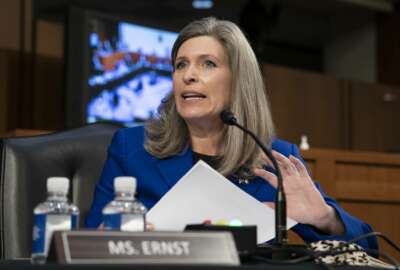What conservative lobbyists expect from Doug Burgum at Interior
"The primary issue that I am concerned about with Governor Burgum actually is related to federal lands and the wild horses on federal lands," said Marty Irby.
President-elect Donald Trump has chosen an eclectic mix of people for his administration. In some cases there’s a definite pro-business slant, though. Two cases in point: Brooke Rollins for Agriculture secretary and Idaho Governor Doug Burgum as Interior secretary. To find out what industry is hoping for, the Federal Drive with Tom Temin turn to one of Washington’s top lobbyists, Marty Irby.
Interview transcript:
Tom Temin And what are you hoping for from Governor Burgum as he becomes interior secretary? Because in some ways, interior and agriculture, a lot of the missions cross over in a lot of cases.
Marty Irby Well, the primary issue that I am concerned about with Governor Burgum actually is related to federal lands and the wild horses on federal lands. We’ve seen the Biden administration round up more wild horses than any administration in American history and actually capture them and put them in holding facilities to the cost of the American taxpayer, ultimately seeing those horses end up at slaughter. Governor Burgum had recently helped with a herd at the Teddy Roosevelt National Park there in North Dakota, where the federal government was after the herd trying to round them up. And he was instrumental in saving that herd and those wild horses. So we feel really good about that going into this new administration.
Tom Temin My question is, what is the value of the horses that are wild? They’re a nice feature of the landscape. Why would one administration want to round them up and slaughter them?
Marty Irby Well the wild horses actually are tourist attraction that bring in dollars to those states. And the federal government has a long history of trying to round up the wild horses to be able to provide more federal lands for ranchers to raise beef cattle on. And they see the horses as a nuisance. The problem is on the current lands that those horses live, they’re really not costing us much of anything. They’re wild when we round them up. The number is roughly $2,000 a year per horse that it costs to feed them. I think that’s actually low, but that’s the government’s number. And they become a liability really, rather than an asset. So we’re spending federal dollars to round up wild horses so that we can subsidize cattle ranchers in the Western Front. And then those cattle ranchers have an advantage over southeastern producer who don’t have those type of land. So it’s all about money.
Tom Temin Right. So how do you balance the interests of cattle and horse enthusiasts in a place where they coexist?
Marty Irby It’s really tough. I think that they can coexist. What we’ve seen is just it’s about time the rancher wants to call those horses a nuisance and get them out of the way rather than working around them. And I think that it’s a cultural sort of mentality. Cliven Bundy, if you will, he’d be in that category. And most of the folks out there aren’t really like that, but there are a few that are very wealthy, very powerful, and they keep making money from this. So they turn around and spend the money back to lobby to be able to round up more and more wild horses.\
Tom Temin Well, that’s, I guess, an important issue to people that care about wild horses. It’s not one of the burning issues, I think, at the top of the American psyche. Trump, of course, has talked a lot about energy on public lands and so forth. And your larger specialty, I guess, is sustainable agriculture. But what about on the energy front?
Marty Irby Well, I think his views on energy are very much aligned with my own. The party actually used to work for former Congressman Ed Whitfield, who chaired the Energy and Power Committee in Congress. So I know a lot about those issues. And I think that we’re going to see a boom here in the U.S. We’ve all seen how high the gas prices have been. We’ve all seen how we’ve been dependent on other countries. And it’s time that we take back control of American energy policy.
Tom Temin Right. So you expect that to work through the permitting and drilling permit agencies, the land management agencies, you might say?
Marty Irby We do.
Tom Temin All right. And sustainable agriculture. What does that mean in your context? And how can the federal government foster it? What is it?
Marty Irby Well, sustainable agriculture really is a term that’s been used widely over the past decade. And I liken it to say it’s the opposite of what I call factory farming, where animals are kept in warehouses, caged where they can’t move, turn around. You see pigs in gestation crates on many occasions, chickens and battery cages, sometimes six deep in a box the size of a microwave. So I think that he’s going to offer a good opportunity to see some of the practices that we approve of. Farmers are utilizing in North and South Dakota, where they’re more free range and wide open, and the animals are happier, safer. And it ultimately leads to a better food quality product for those that are consuming.
Tom Temin That sounds like one of those issues where maybe those to the left of center and those of the right of center then kind of agree.
Marty Irby I would think so. We do have actually more people on the left that actually have been more involved with humane and sustainable agriculture. But I think those on the right have really opened their eyes, especially in light of COVID when they saw things that were no longer on the shelves. So it’s definitely a new era in that space. And we’ve got a lot of good things coming our way.
Tom Temin Well, how does that work in practice? That is to say, locally, say here in the Eastern seaboard, you can go to specialized places and get very expensive chickens that walked around pecking, which chickens like to do. And sometimes they taste better than the factory raised chickens. But yet there’s a big economic impact, because most of the food that the most people eat comes from this kind of factory farming that you describe. Is it possible to do sustainable type of agriculture, animal husbandry in such a way that everyone’s not paying $5 a pound for chicken?
Marty Irby I believe that there is, and that’s really more in the space of the U.S. Department of Agriculture. As I know, we’re going to talk about Brooke Rollins, who’s been nominated there. A lot of folks think that it’s going to cost a ton of money for them to buy a certain type of product. But what they really don’t think about is the long term cost because of health care, eating these type of products that may have antibiotics that have led to many diseases like diabetes, cancer, other things that people have seen and studies have shown can be tied back to factory farm products. Now, when I talk about externalizing the cost, that means the runoff, the waterways, things like that, people in the community that get sick. And then that leads to these long term health issues. So you could spend a little more now and live a lot longer and have a healthier life, or you can spend less now and pay the consequences later, I guess. But I do think that we’re seeing a movement in the U.S. where people are migrating in that direction. Farms all across the country, north, south, east, west, that are raising animals free range. And consumers want to buy that type of product more and more each day.
Tom Temin We’re speaking with Marty Irby. He’s a lobbyist for sustainable agriculture and president of Capitol South in Washington, D.C.. And what about the large companies? I don’t know that much about the chicken industry, but Tyson’s and Perdue are family household names in that business. There’s a few other big ones. They don’t grow free range chickens, as far as I imagine.
Marty Irby Well, Perdue actually does. They’ve migrated in the right direction over the past decade or so. But largely the four big packers, which are JBS, that’s based in Brazil, Smithfield, that’s wholly owned by the Chinese, Tyson and Cargill control the meat industry, and I call them the global meat cartel because they have most of their products factory farmed. And not only are the animals in terrible situations, and have been treated terribly on many occasions, but the farmers themselves are basically modern day indentured servants to these corporations. So we hope that when we see these new secretary of agriculture, secretary of interior and other cabinet members come in, that they’re ready to bust up what I would call a trust with the four big packers and put production back in the hands of the American family farmer.
Tom Temin Sounds like you’re looking for Justice Department issues there.
Marty Irby Well, we are. And there’s actually a specific division at DOJ that works on these issues. We’ve worked with the previous Trump administration, the current Biden administration, and I’m sure we’ll work with, hopefully, Attorney General Bondi on these issues. She’s actually been a good friend to us on many of the issues when she was AG in Florida, helped us get some ballot measures passed. So I think that’s another avenue where we’re going to see a lot of positive things happen. But of course, everybody has to wait until the new administration gets in and things get geared up and they have the right people in the right places.
Tom Temin And with respect to the subcontractors and suppliers, to these four large conglomerates that you mentioned based outside of the United States in a couple of cases, are you referring to farmers in the United States that sell their goods, their beef for their chicken or hog output to these conglomerates who then pack it and market it?
Marty Irby That’s correct. So many of these farmers now use poultry as the example. They have tons of contract poultry growers. They’re forced to raise a chicken a certain way with a certain type of feed. They have no control over the feed that’s brought to them. And I have some good friends that work together with me at the Alabama Contract Poultry Growers Association who have basically lost everything, because they did not comply with the chicken mafia. Jonathan Buttram, who is a poultry producer there, had a movie actually out Super Size Me to Holy Chicken a couple of years ago about this. So we want to see farmers make money, farmers be able to get a good return on their investment and Americans build have happier and healthier products to eat.
Tom Temin So you’re really not a classical big business lobbyist?
Marty Irby I am not. I definitely in a minority in Washington, D.C., I don’t really take on any issues that I don’t believe in. So as a consequence of that, most of my clients actually happen to be nonprofits. But you know what, I sleep well at night.
Tom Temin And speaking about the antibiotics or runoff problems that might affect public health through water supplies and so forth, that gets you into Health and Human Services territory where Robert F Kennedy seems to have some consonants in this idea of what it is that goes into food, not just processed food, but chicken we think of as raw food, but that’s also full of antibiotics in many cases and whatever it is that they keep them from infection.
Marty Irby Yes, absolutely. And I will say I am a huge fan of RFK Jr. I had a very long conversation with him in person last December about these issues, about the USDA’s Commodity Checkoff programs, Smithfield, the run off, the hog waste. He actually was instrumental in starting Waterkeeper Alliance many years ago that addresses these issues because the hog waste, especially in North Carolina and Iowa and states like that, are polluting the land and causing people in those communities to become sick from the ammonia and the different types of chemicals that we see in those type of production facilities. So it really is about health and human safety. And I think that it starts on the plate with what you eat.
Tom Temin And the green lobby, to use one extreme, has been lobbying in some ways for a number of years now. About maybe let’s not eat beef and pork and so forth in the first place. You don’t go that far.
Marty Irby I don’t I’d actually advocate that beef is the most humane type of product to eat, because on average, I believe if you measure animal welfare by the number of lives, 136 chickens to equal one cow. So if you think about the mass and the weight and the body size of that animal, to me personally, beef is the most humane thing to eat. I don’t know that everyone in the areas I work would agree with me on that. But I also like to eat steak very much, and I know a lot more about the type of products that are raised. You can’t cage a cow at the end of the day like you can a chicken or a pig.
Tom Temin Right. I was wondering if you were a vegetarian. That’s a question for me.
Marty Irby Not a vegetarian.
Tom Temin But the argument is made that from one end of the cow to the other, that is, the gases and flatulence at one end is an air pollutants or a carbon issue. And then at the front end, the grasses and grains that are raised with water and so forth to feed the cattle is at least some people say is a non sustainable model. But that’s not your position.
Marty Irby I think people are not looking at it from a standpoint of apples to apples. They’re looking at it apples to oranges because of what I said. If you measure, and I don’t know what the numbers are, but if you measure the emissions from those 136 chickens versus one cow would be interesting to see. What I would say is there’s a farm in south Georgia. White Oak pastures, Will Harris, a tremendous guy there. That’s the type of farm to me, that’s the epitome of what we should have in the United States. The best of the best. And every animal is born and raised on site, slaughtered on site, never given antibiotics. And then they’re packaged and sold all over the country, supply mostly Whole Foods and places like that. So if you go to the meat market, I’d recommend looking at the meat counter at Whole Foods and buying what they call Gap Global Animal Partnership products that are rated based on a system of those metrics.
Tom Temin And by the way, have you looked at or do you know what’s going on in the kosher end of meat production? And in the halal end specialties?
Marty Irby I have in the past, not most recently. We’re working to actually defeat a measure in Congress called the Eats Act that would nullify most of the kosher laws across the country, and of course, have had a ton of people in the Jewish community up in arms about that. So you have actually some Republicans, Senator Roger Marshall in the Senate, and Congresswoman Ashley Hinson in the House that are pushing that legislation. And it’s really a shame to see. But I do think that there’s a huge demand for those products, and I hate to see the attacks that are out there on them.
Copyright © 2024 Federal News Network. All rights reserved. This website is not intended for users located within the European Economic Area.
Tom Temin is host of the Federal Drive and has been providing insight on federal technology and management issues for more than 30 years.
Follow @tteminWFED






